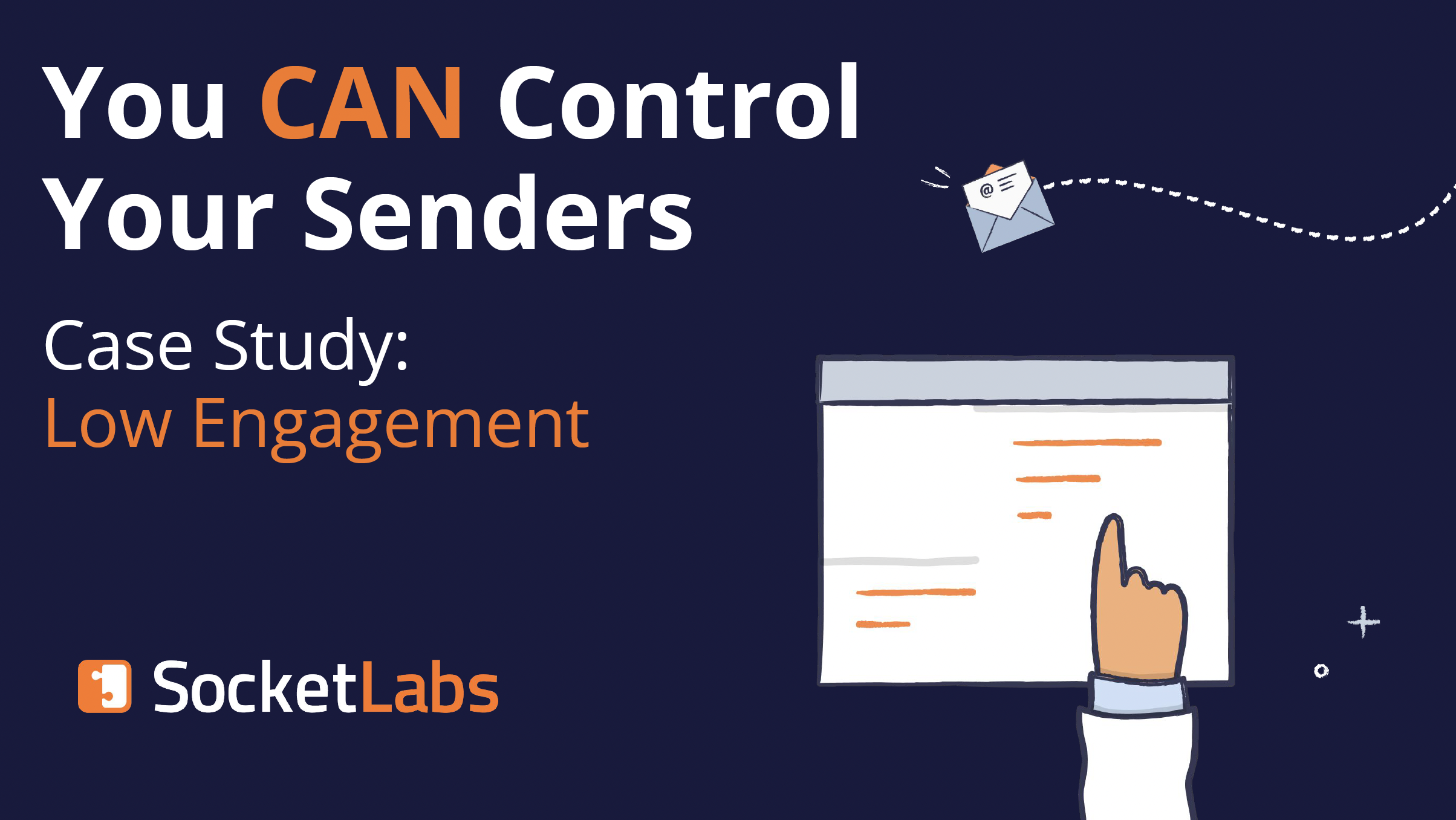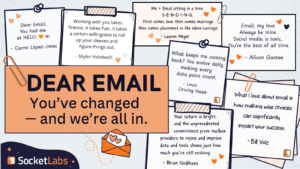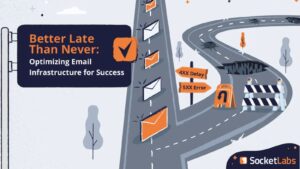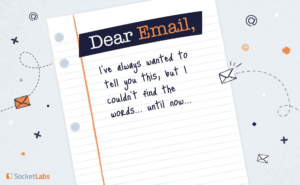https://socketlabs-1.wistia.com/medias/ro3q194bmb?embedType=async&videoFoam=true&videoWidth=1280
Total Runtime: 13:47
1:29 – Having been in the industry for quite some time, seeing many aspects of email, what brought you to the delivery side of email at SocketLabs?
4:39 – What should we make of the numerous mergers and acquisitions taking place in the email industry and how does that affect our mission at SocketLabs?
7:38 – How is SocketLabs investing in people and product to make an email solution that’s completely unique to the industry?
9:48 – How is SocketLabs directly addressing email challenges that businesses are facing as they grow?
(Keep scrolling for a full transcript of the conversation.)
Building a Better Email For Modern Business
Once in a while you will hear someone doubting the relevance of email as new technologies continue to grow around us. But the truth is, email isn’t going anywhere…quite the opposite. Email is becoming an even more effective business communication tool as new technologies arise. But that doesn’t mean email as we know it is perfect!
Join SocketLabs’ CRO Brandon Dingae as he takes us through some amazing areas SocketLabs is exploring in email and how they are building a better, simpler email for modern business.
The Conversation:
Lauren:
Hi there. My name is Lauren Meyer, EVP of Product Marketing & Brand Strategy for SocketLabs. Today, I’m sitting down for an interview with our Chief Revenue Officer, Brandon Dingae. He’s been in the industry for more than 24 years. So I’ve got a few questions for Brandon about what brought him to SocketLabs after so many years in the email industry, what challenges he’s seen email senders face, particularly those high-volume senders who are still growing their business, and how SocketLabs plans to address those challenges that email senders are facing.
So for those of you who don’t know, Brandon, I’ll give you a little bit of a summary of kind of what he’s been up to for the past 24 years. He started his career at Message Media, which became Double-Click and then later Epsilon. He later moved on to roles focusing on building partnerships in a global go-to-market strategy for industry players including Return Path, Proofpoint, 250ok, and Validity. And all of that email knowledge, plus a passion for delivering a solution that truly meets the unique needs of each of his customers, regardless of what product he’s actually working for, or focusing on, has culminated in his current role as the Chief Revenue Officer for SocketLabs.
And, you know, I didn’t even mention the fact that he’s also a bit of an expert on DMARC, thanks to his Return Path days. So all of that comes in handy when your mission is building the best email company in the industry. So thanks so much for being here today, Brandon. I’d love to, to kind of dig into this stuff.
So what do you say, should we kick off this interview?
Brandon:
Yeah, let’s get started!
Question 1: Having been in the industry for quite some time, seeing many aspects of email, what brought you to the delivery side of email at SocketLabs?
Brandon:
There’s a handful of reasons that really made this apparent that this was a good fit and easy decision. And the first thing that jumped out to me was the products. We have our own proprietary MTA. We have a cloud offering that’s powered by our proprietary MTA. And we have access to really powerful data points that we surface to our customers and it really helps them be proactive and successful in managing sending email at scale for their business.
We are the largest independent MTA provider, and that gives us the flexibility to go out and serve the largest senders in the industry, or senders that have really complex needs for their business and address it with flexible solutions that live under the SocketLabs product portfolio. I think that is a strength that right now, the market needs and companies are going to be hungry for.
Another piece that was also really important to me was the people here at SocketLabs. We have an awesome group. I mean, there’s no other way to describe it. And they’re really agile. They’re very smart and they’re constantly innovating ways that we can make our customers successful in using email that addresses their business’s needs. And to me, that’s really exciting and valuable.
But then as I look at the bigger picture, there was an opportunity to do something unique. And Tim, our CEO, he put a pretty bold statement out there, that “email is yet to be optimized”. And I wholeheartedly agree with that. And I think a lot of the top minds in email, it’s also resonating with them. And I’m looking at you, now sitting here on a video interview with me at SocketLabs, it’s a testament to that being a powerful statement that rings true to the folks in the email industry. And I think our customers are also going to feel that way as well.
And then the last thing that I forgot to mention is that email is not dead. That’s the thing that gets me excited, there’s folks out there that continue each year. Somebody wants to raise their hand and say, “email is dying” or “email is dead”. And I think if you look at the recent activity in the email world around acquisitions and consolidation, you can see that that’s not really the case. And actually, email continues to be kind of the workhorse of the enterprise. And it’s highly valued. You look at either the companies that are acquiring the email infrastructure companies, or the price tag that’s being associated with those companies. Either way you look at it, there is value to what’s going on in the email world. And to me, that’s also very exciting that we have the opportunity to continue to optimize email’s future.
Lauren:
And I’m really glad that you brought that up for a couple of reasons. First of all, because email is absolutely not dead! But also because we are seeing just one merger and acquisition after another in this industry, and there are just so many recent examples
Question 2: What should we make of the numerous mergers and acquisitions taking place in the email industry and how does that affect our mission at SocketLabs?
Brandon:
Yeah, I think it does a couple things. One, it just reinforces, again, that email is so important to businesses and their success of either engaging with their customers or getting that right message at the right time. But, you know, it will open up an opportunity for us to continue to really be laser focused on what we do really well, while I think the rest of the market will be focused on probably what I would consider things that fall outside of their core competency right now. And that may be focusing on content, that could be focusing on marketing automation. Those types of initiatives that fall outside of what the traditional email company that got acquired was focusing on.
And more often than not, we see those once-innovators kind of go after that sparkly prize of growth and they tend to hang up their ambitions for innovation and focus on growth. And, and then what happens is downstream, the customers are impacted by not getting a great customer experience or a great product in front of them to enable their email needs. So that’s where I really see that impact.
And when I think of that, innovation is in the DNA of SocketLabs. It has been since the start of the company, and it’s something that’s at the forefront of the teams that continue to either build products or they are servicing our customers. It’s really a focus on just, what’s the best way to be solving the problems for our customers. And if we don’t have it today, how can we build it for them?
So that we’re that trusted provider for our customers.
You know, when I think about the group of people we have here. You think of Bill Volz, one of our founders, who’s laser focused on innovation and just doing amazing things to try to take email to the next frontier of delivery. And then I look at Brian Godiksen, who’s been at SocketLabs for over 10 years, and he knows the ins and outs of our MTA. He is well-respected member of the email community, and he’s really customer-focused, which is just amazing.
And then we have some recent hires that also get me excited. It’s Lijin, who is an actual data scientist. And then our most recent hire, Louis Driving Hawk, who’s going to take our reporting and insights to the next level.
We’re continuing to bring in great folks at SocketLabs that are gonna help us continue to make email great for our customers.
Lauren:
I love that. And I totally agree. And I think there’s, so much to be said for just bringing together that convergence of people and product.
Question 3: How is SocketLabs investing in people and product to make an email solution that’s completely unique to the industry?
Brandon:
So another great question to think about, is where do we fit in that is special? Because we do operate in the cloud side of the world. And we also operate in the on-premises side with our proprietary MTA. And what we’re able to do, is really come with an approach where it’s “email delivery, your way” when we’re talking to our customers. And I think that mantra is something that’s in the front of the minds for everyone inside SocketLabs, when they’re thinking about customers and how we can work with them. And what we’re really thinking about is the tailored solutions that we can provide for high-volume senders, or senders that may have a complex use case, or an out-of-the-box use case that other providers can’t address or won’t address.
And we can do that by tailoring together a product and a service and types of custom reporting that will help them be successful in leveraging email the way that they want to for their business. And I think that’s the key part, is how a business wants email to work for them, versus the inverse of that statement, where I think most businesses feel like vendors are just trying to make a piece of technology work for them.
Lauren:
Yeah. And this really speaks to me as a deliverability person. Because a lot of my world in the email space has been people asking me questions. Like “what’s the best way to go about doing X” or “what’s the best technology to accomplish Y” or something like that. And my answer tends to really start with, “well, it depends.” What are you trying to do? What’s this, what’s that? What are you using? So it’s just nice that we have the technology that allows you to kind of choose your own journey within email, but it also is paired with experts who not only understand this industry really well, but also understand the technology itself. People who’ve been here for more than a decade. Clearly they know the best ways to accomplish something within our platform.
Question 4: How is SocketLabs directly addressing email challenges that businesses are facing as they grow?
Brandon:
You know, as companies evolve and grow, email is kind of a constant that continues to run with the business, but it also carries the baggage of the growth as well. So there’s lots of interesting history that comes with an email system, or email infrastructure at a company. Just through the evolutions of their business growing. And when you think about that, there’s just challenges that come about for them.
One, a lot of businesses eventually are going to outgrow the cloud. By our estimation, if you’re sending around 500 million a month, to 1 billion a month, the CPA model starts to break and it starts to not be in your favor. And so then it looks like, well, what are my options to go outside of the cloud? And right now, that’s not clear. I think we aim to make that very clear for the market. There is a viable solution that could take you to a better place, ultimately, in sending that high a volume of email.
And then there’s other companies that just have the reality where the cloud is not a destination they’ll ever get to, just because of either the regulations they have in their business around privacy and data that they need to operate an on-prem world. But the solution they’re using right now in that on-prem world is one that probably hasn’t been innovated on in a while. And hasn’t really worked for their business in the way that they want it to.
But then when you look at companies also that are growing, that have built their own homegrown solution, or they’ve contracted with another on-premises provider. Their teams are pretty strapped for resources, probably one or two people that are managing that system. Probably not a lot of innovation coming out of that group. They’re more worried about maintaining this mail system along with the rest of their job. And so when you look at that, one: you’re just hoping email continues to work the way that it should work. And then what happens if that person or people leave? What’s the contingency plan around those people leaving? That leaves a pretty big gap and a pretty big risk to the business if there’s people that don’t really know the ins and outs of the mail system. So that, to me, that’s one of the biggest ones that jumps out when people are thinking about how email is working for their business.
Lauren:
It’s funny because this one really speaks to my past where, you know, you have all of this M&A activity within our industry. So you’ve got co-founders who are building a business and then kind of leaving at some point. We had this in, in a couple of my past companies, where there’s always that one black box server that nobody really knows what to do with, or how to fix, but it’s like the lynchpin in your entire organization. So that’s where you start to see those limitations with, “oh, well, we can’t do that because we’re tied to this system or we’re not sure how to fix that thing because it lives within that black box.” So yeah, it really is one of those challenges that people are going to continue to see in this industry. So I love that we’re creating solutions and we’re trying to make those as simple as possible, right.
Closing
Lauren:
Well, I think that brings us to the end of yet another episode email geeks.
Thanks so much for tuning in and thanks to you, Brandon, for sharing your experience with us. Now everybody, get back to work! And get going, producing your emails. Thanks everybody.
Brandon:
Thanks, Lauren.







